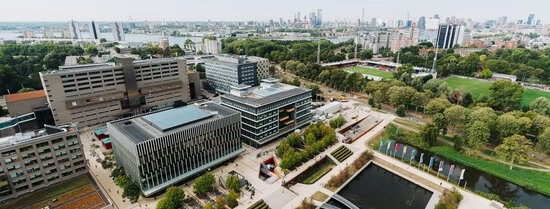We hereby kindly invite you to two separate events with Marwa Arsanios and Sami Khatib, the first one will be an informal, narrow circle (i.e., ESPhil only) conversation with our guests, the second one (info below) is the public colloquium. For the first event, on the 19th, we invite everyone at the faculty to join. If you’d like to, please prepare questions in advance that might spark interesting conversations with our invitees.
- Date
- Tuesday 20 May 2025, 16:00 - 18:00
- Type
- Lecture
- Spoken Language
- English
- Room
- Willem de Kooning Auditorium
- Ticket information
Registration is mandatory
Monday 19 May: internal conversation with Marwa and Sami
Location: Glasbak
Time: 16:00-18:00
Tuesday 20 May: public colloquium
Location: WdKA auditorium (registration needed: https://www.aanmelder.nl/165804/subscribe)
Time: 16:00-18:00 —followed by drinks at de Willem
For the Human Conditions Spring colloquium of 2025, we join forces across institutions and merge disciplinary borders between philosophy and art. We would like to invite you to this very special event with artist and theorist duo Marwa Arsanios and Sami Khatib. The WdKA HP core tutor team and the Desire and Capital (D+C) working group at the Erasmus School of Philosophy (ESPhil) are very excited to collaborate on this event and welcome everyone from both institutions to join us for an evening on the topics of melancholia, repetition and return, at the WdKA auditorium on May 20th, 2025. Please find the schedule and the abstract for their talk below.
Marwa Arsanios is an artist, filmmaker and researcher whose practice tackles structural and infrastructural questions using different devices, forms and strategies. Arsanios was a researcher in the Fine Art Department at the Jan Van Eyck Academie, Maastricht (2010–12). She completed a PhD at the Akademie der bildenden Künste in Vienna. Sami Khatib is professor of Art Research and Media Theory at Karlsruhe University of Arts and Design (HfG) and a founding member of the Beirut Institute for Critical Analysis and Research (BICAR). His publications include a co-editorship of the volume ‘Critique: The Stakes of Form’ (Zürich, Berlin, 2020) and authorship of the book “‘Teleologie ohne Endzweck’: Walter Benjamins Ent-stellung des Messianischen’ (“‘Teleology without End’: Walter Benjamin’s Dislocation of the Messianic”, Marburg, 2013).
Besides engaging in dialogue with our invited guests, we will also hear from our ESPhil acting dean, Liesbeth Noordegraaf-Eelens, who will make an announcement regarding future plans for the cross-institutional collaboration between WdKA and ESPhil. We look forward to welcoming everyone to what will be a very inspirational event for art and/or philosophy students, colleagues, and everyone between and beyond these categories.
Schedule:
16:00 - Liesbeth Noordegraaf-Eelens: RASL announcement
16:15 - S. de Jager: brief introduction
16:30 - Sami Khatib + Marwa Arsanios: presentation
17:30 - Discussion moderated by Sami Hammana and S. de Jager
18:00 - Closing drinks at De Willem
Melancholia, Repetition, Return
Ever since Sigmund Freud’s distinction of melancholy and mourning (1917), melancholy has been discussed along with and vis-à-vis depression and narcissism. Relying on political critique, cinematic and historiographic sources, the workshop aims at challenging this specifically modern framing of melancholy as individual symptom, pathological affect and mental disorder. In its modern version, melancholy is linked to both the fantasy and the reality of the “lost object” of desire. The lost object can either be a fantasy of something that has never been possessed in the first place, or a faithfulness to an actual loss in history. As the histories of anti-colonial struggles tell us, the loss of land and the struggle for return are not zero-sum games, the melancholic subject as oppressor keeps on compulsively repeating the act of a repressed conquest, while the melancholic subject as oppressed keeps on insisting that loss is real and justice can be actualized. As political promise, collective desire and discursive battleground, melancholy acquires a historico-political significance, expressing the faithfulness to lost (failed) revolutionary battles (1848, 1870/71, 1918/19, 1967, 1989, 2011) and anti-colonial fights for land (1791-1804, 1947/48, 1954-62). In this vein, the workshop explores the analytical capacity of melancholy as a lens of political, social and artistic critique.

- More information
followed by closing drinks at de Willem, Willem de Kooning
Academy -Wijnhaven 61

